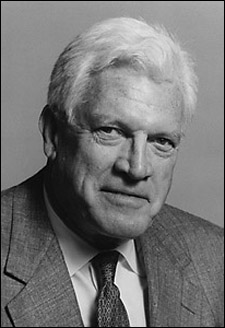Andrews, HBS professor, Twain scholar, 89
Father of corporate strategy, editor of Harvard Business Review
Kenneth R. Andrews, who began his academic career as an authority on Mark Twain and went on to become a renowned professor at Harvard Business School (HBS), a founder of the field of corporate strategy, editor of the Harvard Business Review, and a beloved master of Leverett House, died on Sept. 4 at his home in Durham, N.H. He was 89 years old. 
A member of the Business School faculty for 40 years, Andrews retired from the active faculty in 1986. At the time of his death, he was the School’s Donald Kirk David Professor of Business Administration Emeritus.
A Phi Beta Kappa graduate of Wesleyan University, where he earned a bachelor’s degree in English in 1936 and a master’s in American literature a year later, Kenneth Richmond Andrews was pursuing a Ph.D. in English at the University of Illinois, Urbana-Champaign, when his studies were interrupted by World War II. Drafted into the service, he found himself at the Army Air Force’s Statistical Control School, which was held on the HBS campus and taught by members of the School’s faculty.
With the end of the war, Andrews, who had risen in rank from private to major, returned to the University of Illinois in 1946 to complete his dissertation on Twain. Within a few months he received a call from HBS Professor Edmund Learned, offering the opportunity to join a multidisciplinary teaching group being formed at the School to teach a new course in organizational behavior called “Administrative Practices.” What clinched the deal in HBS’s favor was the opportunity for Andrews to also continue his research at Harvard’s Widener Library, which housed Twain’s private papers, and to complete his dissertation (which was published to critical acclaim in 1950 as “Nook Farm: Mark Twain’s Hartford Circle”).
Remaining at HBS after receiving his doctorate in 1948, Andrews taught MBA students, wrote case studies, and undertook an exhaustive survey of the effectiveness of university and corporate executive training programs. Around the same time, he was asked to join a small group of other faculty reviewing the School’s required course in business policy, in which MBA students examined the problems of an entire company from the perspective of top management.
This group developed the concept of corporate strategy as the organizing principle of the course. As a result of these efforts, the business policy course underwent a complete revision and influenced the work of other professors’ course development.
“Ken Andrews’ contributions to Harvard Business School were enormous,” said HBS professor and strategy expert Joseph L. Bower. “With Professor C. Roland Christensen and others, Ken Andrews built the field of business policy, which laid the foundation for what we now think of as the field of strategy. … For me personally, he was a very wise and caring mentor, and I felt particularly honored to succeed him in the chair named after former Dean Donald David.”
In 1971, Harvard President Nathan Pusey appointed Andrews the master, or head, of Leverett House. It was an assignment that Andrews – with his wife, Carolyn, as Leverett’s first co-master – completed with great success over the next decade.
After his move into Leverett House, Andrews began his long association with the Harvard Business Review (HBR), first as chairman of its editorial board from 1972 to 1979 and then as editor from 1979 to 1985.
Andrews received an honorary master’s degree from Harvard University in 1957. He also received the Distinguished Service Award from Harvard Business School in 1990; the citation for that award read: “He understands, as Mark Twain never did, how business works best; his writings elucidate the complex subject to the benefit of his Harvard colleagues and of managers everywhere.”
A voracious reader until his death and a New York Times crossword puzzle enthusiast, Andrews also found solace in the outdoors and developed a passion for gardening and boating.
He was married to Edith Platt from 1945 to 1969. She died in 2002. His marriage to Carolyn Erskine Hall lasted from 1970 until her death in 2002.
He is survived by a son, Ken Jr., of Marlborough, Mass.; a daughter, Carolyn, of Maynard, Mass.; three stepchildren, Lyn Hejinian of Berkeley, Calif., Douglas Hall of San Francisco, and Marie Katrak, of Durham, N.H.; six grandchildren; and nine great- grandchildren.
Services will be private.




